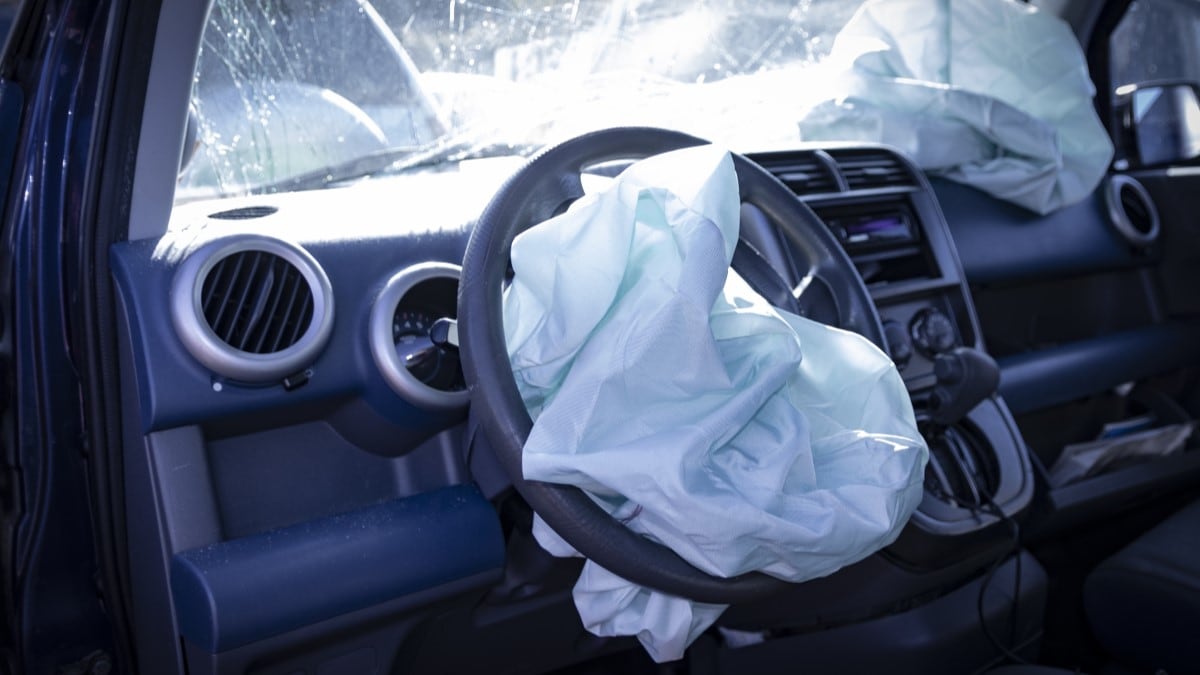An alarming report in the Wall Street Journal finds that at least five times in the past year, “people have been killed or seriously injured by counterfeit airbags” in their cars. Those, the Journal notes, “are only the known cases.” Counterfeit parts can be difficult to detect, so the actual number may be higher.
The Automotive Anti-Counterfeiting Council, an industry group, calls the trend “an unusually high number in such a short time span,” suggesting a widespread problem largely undetected until now.
A Safety Device That Can Be Dangerous
Airbags save lives. The National Highway Traffic Safety Administration estimates that frontal airbags alone “have saved more than 50,000 lives over a 30-year period.”
But, to work, they must create a contained explosion. Cheap, improperly made versions can fail to contain that explosion.
An airbag inflator is a small metal capsule containing chemicals that combine to create a rapidly expanding gas. In an accident, the inflator is supposed to squirt that gas out of a nozzle, quickly inflating a folded airbag so that it can cushion occupants from hitting collapsing car parts.
A counterfeit airbag can fail to inflate quickly enough to make a difference. Worse yet, it can burst, sending hot metal fragments flying into the cabin like shrapnel. That phenomenon is behind history’s largest safety recall — the Takata airbag scandal, which is believed to have killed dozens of drivers and passengers on several continents over the past decade.
In a recent lawsuit, Destiny Byassee’s family alleges that a counterfeit airbag inflator exploded, Takata-style, in the used car she purchased. The 22-year-old mother of two died as a result last June.
Law enforcement agencies have stepped up attempts to combat fraudulent parts, the Journal reports. But the problem has many roots.
A Problem With Many Sources
Federal agents arrested a Memphis, Tennessee, mechanic in March and charged him with selling hundreds of the devices on eBay. Local news station FOX13 reports that investigators found more than 2,000 of the fake devices at his home.
Florida police similarly charged a Homestead, Florida, auto parts store owner with selling counterfeit airbags labeled with the Chevrolet, Toyota, Nissan, Lexus, and Mercedes-Benz brands, according to ABC-affiliate WPLG.
It can be difficult to trace how the parts enter cars. They are typically used in post-crash repairs, but repair shops may or may not be aware they have a counterfeit part in their supply.
Fakes Hard To Detect
Authentic airbag modules can cost as much as $1,000. Fakes go for as little as $100, the Journal reports. But car parts often pass through a complex chain of suppliers before reaching repair shops, making it difficult to determine where frauds entered the parts stream.
In one incident, for instance, Congressional investigators recently found that three automakers may have bought parts from a company that bought parts from another company that bought parts from yet another company that used forced labor in China.
The Journal notes that even dealerships have been fooled by fakes. Automakers have begun “warning dealers to be more vigilant, with many knock-offs bearing logos and markings almost identical to those on legitimate brands.”
Another Massive Airbag Recall Could Feed Supply of Fakes
Automakers worry that another Tataka-style recall could feed the fake market. The National Highway Traffic Safety Administration last year launched an investigation into airbag inflators made by Tennessee-based ARC Automotive. The safety agency fears tens of millions of cars may have ARC-built inflators at risk of exploding.
But, the Journal notes, automakers worry than an order to replace them all “could result in anxious drivers and repair shops unwittingly receiving the phony modules.”
Several Possible Solutions
Nearly three-dozen states, the Journal reports, have adopted prohibitions on imitation parts.
But lower-cost aftermarket parts help millions of Americans afford increasingly expensive car repairs.
So, some have a simpler solution in mind. “Automakers have also urged eBay to stop the sale of all airbags and related parts,” the Journal explains. Both Amazon and Alibaba “have policies that ban sales of airbag parts.”
What You Can Do
The National Insurance Crime Bureau recommends that drivers take four steps to protect themselves:
- When turning on the ignition, look for the airbag dashboard light (check your owner’s manual if you do not know what it looks like). If the light stays on, starts flashing, or doesn’t flash on at all, your airbag system probably isn’t working.
- Before you purchase a used vehicle, make sure to have it inspected by a trusted, certified mechanic. Ask them to specifically check the airbags.
- If your vehicle is involved in a crash in which an airbag deployed, consider having the airbag replaced at an authorized car dealership repair shop.
- Support state legislation that criminalizes the manufacture, sale, and installation of counterfeit airbags.








